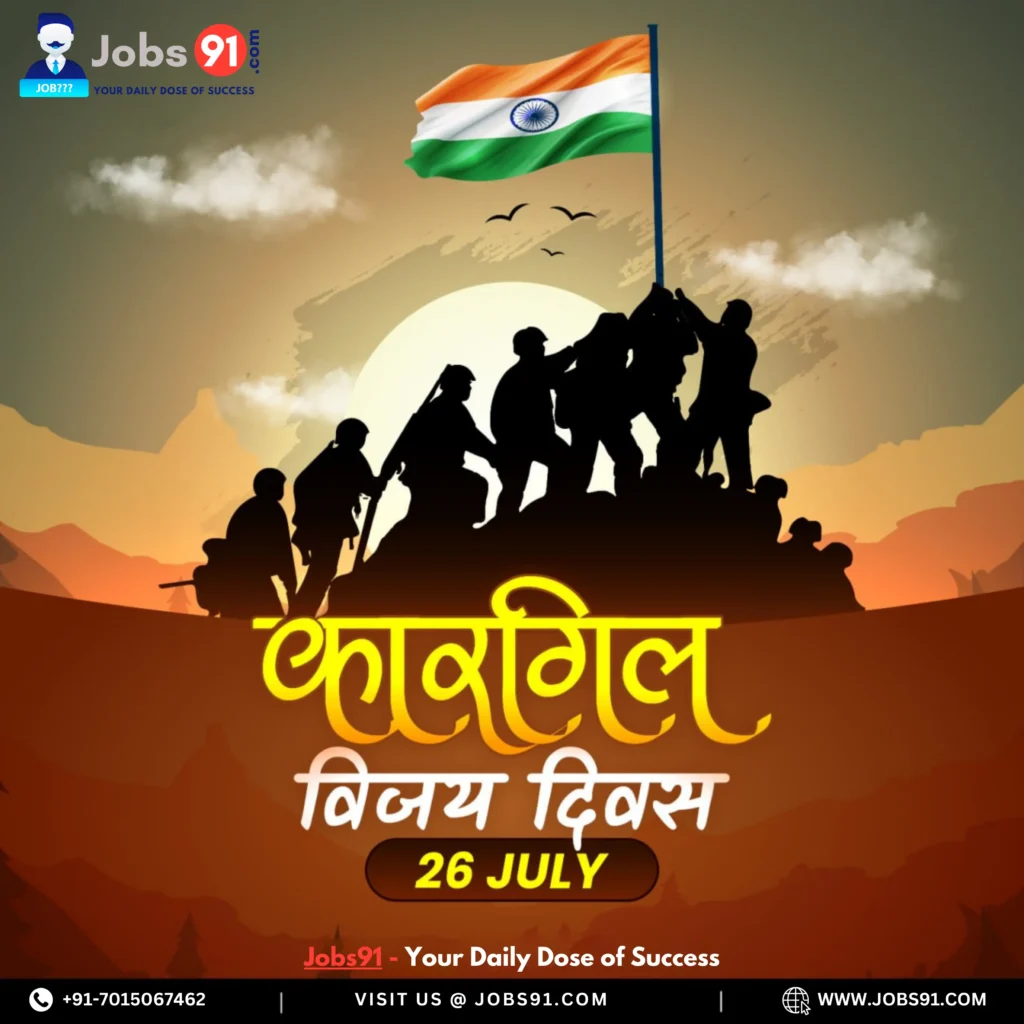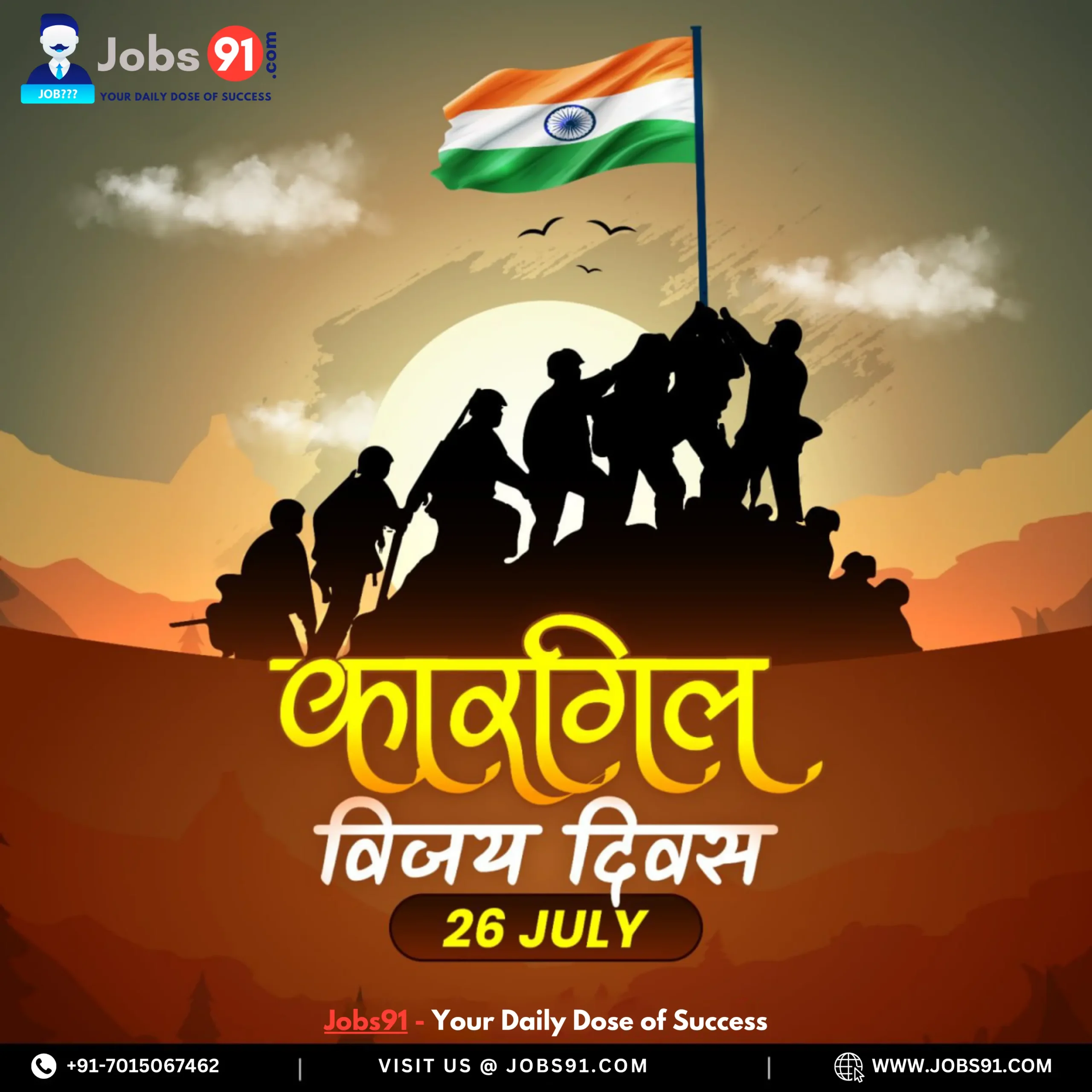Table of Contents
Kargil Vijay Diwas, observed annually on 26 July, is not merely a date on the calendar—it’s a symbol of unmatched courage, sacrifice, and national pride. On this day, we honor the memory of India’s brave soldiers who reclaimed the heights of Kargil in 1999 and gifted the nation a resounding victory. Kargil Vijay Diwas is not just a date on the calendar; it’s an eternal reminder of what true patriotism, sacrifice, and valor mean. Delve into the human stories behind Kargil Vijay Diwas. This post uncovers touching accounts of bravery, the emotion behind Operation Vijay, and the continuing impact of the Kargil War on the nation’s soul.

Kargil Vijay Diwas – More Than Just a Day on the Calendar
Every year, as the summer heat peaks around July 26, there’s a chill that sweeps through millions of Indian hearts. Kargil Vijay Diwas is not just a chapter in school textbooks, or a trending topic on social media. For so many, it’s a day that brings back a flood of memories, a surge of pride, and sometimes, tears that refuse to be held back.
It’s a day when the nation collectively pauses, salutes, and remembers—the “why” of our freedom, and the human faces, stories, and dreams behind that freedom.
What is Kargil Vijay Diwas? The Emotional Origin
Kargil Vijay Diwas marks the day in 1999 when India successfully conducted Operation Vijay, reclaiming all the occupied territories from Pakistani infiltrators in the Kargil sector of Jammu & Kashmir. The war lasted more than two months and ended with a glorious Indian victory on 26 July 1999.
This victory came at a cost — more than 500 Indian soldiers laid down their lives, and many others were gravely wounded. But their courage lit a fire in every Indian heart — a fire of pride, gratitude, and unshakable national spirit.
“चलो फिर से आज वो नज़ारा याद कर लें,
शहीदों के दिल में थी जो ज्वाला, वो याद कर लें।”
To truly feel the essence of Kargil Vijay Diwas, you need to look beyond the strategy and statistics. It was the summer of 1999, but for soldiers at the front, it may as well have been a world apart. The peaks were cold, the air was thin, and so many dreams were paused in the mountain wind.
Unbeknownst to most people going about daily life, hundreds of brave souls were fighting for every inch of snow and stone in the Kargil district of Jammu and Kashmir. The cause? Defend the motherland—not just by the might of weapons, but with the weight of memories, handwritten letters from home, and the hope of a nation counting on them.
The invasion wasn’t just a breach of land, but of trust. Yet, what happened next has since become legend.
Backdrop of the Kargil Conflict
The Breach of Trust
In early 1999, Pakistani soldiers and militants crossed the Line of Control (LoC) and occupied Indian military posts in the Kargil region. Disguised as insurgents, their mission was to cut off Leh from Srinagar, thereby disrupting India’s strategic mobility in the region.
Discovery of Infiltration
Indian patrols, led by units like 5 Jat Regiment and Ladakh Scouts, discovered the intrusion in May 1999. What followed was a tactical and emotional war fought at freezing temperatures above 18,000 feet.
Operation Vijay – Real People, Real Courage
Operation Vijay. It means “Operation Victory”—but the name doesn’t capture those late-night phone calls where soldiers spoke to their families, not knowing if it would be the last time. Or the cold ration packets shared among friends, whose laughter masked exhaustion and fear.
Almost 200,000 were mobilized. Some were barely out of college. Some were newly married. And all of them understood that India’s fate, however briefly, rested in their hands and on those Himalayan rocks.
The Indian Air Force ran Operation Safed Sagar—navigating treacherous heights to provide aerial support. Every squadron, every team, was bound by brotherhood more than any command.
The Indian Navy, too, through Operation Talwar, silently blockaded adversarial ports—because in a war like this, every front counts. Every person matters.
The Battlefields: Where History Met Humanity
The Battle for Tololing – Human Fortitude Personified
Tololing became synonymous with sacrifice. For the rest of the country, it was the evening news. For Major Vivek Gupta and his men, it was a last stand, a desperate sprint against time and bullets. Even after suffering deep wounds, Major Gupta’s words to his troops were not of pain, but purpose: “We have to do this. No one else will.”
Tiger Hill – More Than a Peak
Tiger Hill stood tall, literally and metaphorically. The recapture, against impossible odds, was an answer to every family who lit candles at home, praying for their sons, their brothers, their fathers. When the Indian flag soared over Tiger Hill, it was as if a collective sigh of relief swept through millions of households.
More Than a Battle – It was Brotherhood
What must it have felt like for Captain Vikram Batra, famously radioing back “Yeh Dil Maange More!” upon victory? The simple truth: behind every catchy phrase is a beating heart that wants just one more sunrise, one more hug from family, one more laugh shared with friends.
Stories abound—Rifleman Sanjay Kumar taking bullets and still moving onward, Captain Vijyant Thapar, a son writing his final letter, urging his family not to mourn but to be proud.
| Key Battle | Date | Outcome | Notable Hero |
|---|---|---|---|
| Tololing | 13 June 1999 | India recaptured | Major Vivek Gupta |
| Point 5140 | 20 June 1999 | India recaptured | Capt. Vikram Batra |
| Tiger Hill | 7 July 1999 | India recaptured | 18 Grenadiers & others |
| Point 4875 | July 1999 | India recaptured | Capt. Batra, Rfn. Kumar |
The True Cost: Faces Behind the Numbers
Kargil wasn’t won without heartbreak. Over 527 Indian soldiers became legends, giving everything—sometimes, even their identity, in places too cold for names to be carried back home. The wounded, who endured pain long after the celebrations, taught us that real heroism outlasts news flashes.
India was never more united than during those weeks. Children’s piggy banks emptied out for war funds, communities prayed, and even the most ordinary acts—like a cup of tea for a passing soldier—became gestures of solidarity.
Why Kargil Vijay Diwas Matters, Today and Forever
Kargil Vijay Diwas is a day that means different things to different people. For some, it’s the memory of loss. For others, it’s inspiration. For many, it’s a question: could you have stood taller, if fate had asked it of you?
On this day, we see patriotism, not as a phrase but a living, breathing feeling—something that appears in the shimmer of a soldier’s medal and the quiet tears at memorial walls.
Inspiring a Generation: Kargil Vijay Diwas in Our Homes and Schools
Patriotism isn’t just for the battlefield. It’s in schoolchildren painting posters, singing “Ae Mere Watan Ke Logon,” and promising to live a little better, a little bolder.
- Schools organize storytelling sessions, where veterans talk—not with grandeur, but with simplicity—about friendships forged in fire.
- Youngsters take part in essay and art competitions, searching for new ways to say ‘thank you.’
- Rallies and digital campaigns ensure that ‘Kargil Vijay Diwas’ isn’t just an annual event but a daily lesson in courage.
How the Nation Pays Tribute
All across India, from the chilly heights of Dras to city parks, tributes pour in. The Kargil War Memorial, with its eternal flame, is both a place of mourning and of pride. For every wreath, there’s a whispered prayer and a renewed promise.
Online, the hashtags trend but, more importantly, personal stories get shared—stories of grit, loss, healing, and hope.
Related Internal Link: [Learn more about other Patriotic Indian Days in our History section]
Kargil Vijay Diwas Through Their Eyes: The Stories That Matter
No post would be complete without the real people behind the legends:
- Major Vivek Gupta, wounded yet storming Tololing, telling his men, “Your country needs you.”
- Captain Vikram Batra, reminding a generation what confidence and conviction can do—in battle or in life.
- Captain Vijyant Thapar, whose last letter is still read in classrooms and homes, making strangers weep for a son they never knew.
- Rifleman Sanjay Kumar, hailed by comrades for not just saving a post—but saving the camaraderie and faith of all around him.
Their words, their silences, their laughter before battle—they are the reasons we remember.
How Kargil Changed Us All
The Kargil War changed India—not just through laws or defense budgets but in how we treasure peace. Reforms brought better preparedness, and new technology. But the deepest lesson was simple: the nation stands unbreakable when its people remember the ones who stand guard at the gates.
When you next see the tricolor fluttering, recall: it didn’t rise alone; it was raised by thousands who asked for nothing in return.
ALSO READ – महाराणा प्रताप जयंती – 9 मई: एक अमर योद्धा को नमन
Unforgettable Quotes: The Spirit of Kargil Vijay Diwas
“If death strikes before I prove my blood, I promise, I will kill death.”
— Captain Vikram Batra
“Either I will come back after hoisting the tricolor, or I will come back wrapped in it. But I will be back for sure.”
— Captain Vikram Batra
DoFollow External Resources
Conclusion: The Flame We Carry
Every July 26, while the rest of the world may go about its usual business, India pauses—even if just for a moment—to remember. Kargil Vijay Diwas isn’t about glorifying war. It’s about honoring sacrifice, the kind that lets you lead an ordinary life because someone extraordinary stood guard in the cold.
So, as you read this, take a second to whisper a prayer or send a message of thanks. Maybe share a story. Let the spirit of Kargil Vijay Diwas live not just in parades and posts, but in daily acts of kindness, courage, and unity.
जय हिंद! वंदे मातरम्!

